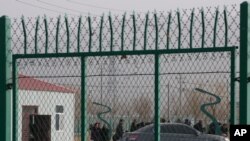The Trump administration on Monday said it will block U.S. imports of cotton, apparel and other products from five specific entities in western China's Xinjiang region, but has shelved proposed region-wide bans on all Xinjiang-produced cotton and tomato products.
Department of Homeland Security acting Deputy Secretary Kenneth Cuccinelli said the "Withhold Release Orders" (WROs) are aimed at combating China's use of forced labor by detained Uighur Muslims in Xinjiang.
He said the administration was conducting more legal analysis of the region-wide import bans.
Customs and Border Protection officials told Reuters last week that they had prepared the broader bans on cotton, cotton textiles and tomatoes, among China's biggest commodity exports, along with the orders announced Monday.
Two people familiar with the Trump administration's internal deliberations said that concerns about the broad orders and their effect on supply chains were raised by key officials, including Treasury Secretary Steven Mnuchin, U.S. Trade Representative Robert Lighthizer and Agriculture Secretary Sonny Perdue.
China also had agreed to purchase increased quantities of U.S. cotton under the countries' Phase 1 trade deal, which could be put at risk by a U.S. ban on imports from China's dominant cotton-producing region.
Department of Homeland Security (DHS) officials said investigations into the broader import bans were still being pursued.
"Because of its unique nature, being, applying to a region as opposed to a company or a facility, we are giving that more legal analysis," Cuccinelli said. "We have not used a WRO like that in China before, and so we want to make sure that once we proceed that it will stick, so to speak."
The Withhold Release Orders allow U.S. Customs and Border Protection to detain shipments based on suspicion of forced-labor involvement under long-standing U.S. laws to combat human trafficking, child labor and other human rights abuses.
DHS said Xinjiang entities whose products will be blocked from entering the United States include all products made with labor from the Lop County No. 4 Vocational Skills Education and Training Center; hair products from the Lop County Hair Product Industrial Park; apparel produced by Yili Zhouwan Garment Manufacturing and Baodung LYSZD Trade and Business Co.; cotton produced and processed by Xinjiang Junggar Cotton and Linen Co. Ltd; and computer parts made by Hefei Bitland Information Technology Co. Ltd.
President Donald Trump's administration is ratcheting up pressure on China over its treatment of Uighur Muslims in Xinjiang, where the United Nations cites credible reports that about 1 million Muslims held in camps have been put to work.
China denies mistreatment of the Uighurs and says the camps are vocational training centers needed to fight extremism.





